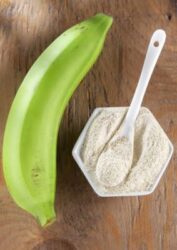Is Banana Good For Gastritis? (Answered)
Inflammation of the stomach lining, which is the hallmark of the disorder known as gastroitis, can result in discomfort and digestive complaints.
Changing one’s diet in order to support gut health is frequently necessary for managing gastritis. We will address the nutritional advantages of bananas, how they affect gastritis symptoms, and how to include them in a diet that is friendly to people with gastritis as we investigate the connection between bananas and gastritis in this article.
Causes and symptoms of gastritis
Many reasons, such as bacterial or viral infections, increased stomach acid production, specific drugs, and lifestyle choices, might contribute to gastritis.
Although the symptoms can differ from person to person, they frequently include nausea, vomiting, bloating, abdominal pain, and loss of appetite.
Also Read: Is Coconut Water Good for Gastritis?
Roles of Dietary management for gastritis
Food is essential for controlling gastritis and fostering good stomach health. Some meals can either make gastritis symptoms worse or better. It’s crucial to concentrate on eating meals that are easy on the stomach, lower inflammation, and encourage healing.
The Relationship Between Bananas and Gastritis: An Overview
The relationship between bananas and gastritis is a topic of interest for individuals seeking natural remedies or dietary recommendations to manage their gastritis symptoms. Gastritis refers to the inflammation of the stomach lining, which can cause discomfort, pain, and other digestive issues. While bananas alone cannot cure gastritis, they are often considered beneficial for individuals with this condition.
Bananas are a popular fruit known for their rich nutritional profile. They are a good source of dietary fiber, vitamins (such as vitamin C and vitamin B6), and minerals (such as potassium and magnesium). These nutrients contribute to overall health and may play a role in managing gastritis symptoms.
One reason bananas are commonly recommended for gastritis is their gentle and soothing effect on the stomach lining. They have a low acidity level, which means they are less likely to aggravate the inflamed stomach lining and cause discomfort. Additionally, the soft and easily digestible texture of bananas makes them a suitable choice for individuals with gastritis, as they are less likely to irritate the stomach.
Also Read: Is Lemonade Good For Gastritis?
Bananas are also known for their ability to help regulate stomach acid production. Gastritis can be associated with an imbalance in stomach acid levels, and bananas may help restore this balance. They contain natural antacids that can help neutralize excess stomach acid and provide relief from symptoms such as heartburn and indigestion.
Furthermore, the presence of certain compounds in bananas, such as protease inhibitors and flavonoids, may have anti-inflammatory properties. These compounds can potentially help reduce inflammation in the stomach lining, which is a key aspect of managing gastritis.
It is important to note that while bananas can be beneficial for individuals with gastritis, the impact may vary from person to person. Some individuals with more severe forms of gastritis or specific dietary restrictions may need to consult their healthcare provider for personalized recommendations.
In summary, bananas have a positive association with gastritis due to their gentle and soothing effect on the stomach lining, low acidity level, potential to regulate stomach acid production, and anti-inflammatory properties. Incorporating bananas into a balanced diet, along with other gastritis-friendly foods, can be a valuable component of a holistic approach to managing gastritis symptoms.
Nutritional Benefits of Bananas for Gastritis Relief
Bananas offer several nutritional benefits that can contribute to gastritis relief. Here are some key nutritional components of bananas and how they can help alleviate gastritis symptoms:
- Dietary Fiber: Bananas are a good source of dietary fiber, including both soluble and insoluble fiber. Soluble fiber forms a gel-like substance in the digestive system, which can help regulate bowel movements and promote healthy digestion. Insoluble fiber adds bulk to the stool, aiding in regular bowel movements. Both types of fiber can help prevent constipation, a common symptom of gastritis.
- Vitamin B6: Bananas are rich in vitamin B6, also known as pyridoxine. This vitamin is involved in various metabolic processes, including the production of enzymes that aid in digestion. Adequate vitamin B6 levels can support proper digestion and nutrient absorption, which can be beneficial for individuals with gastritis.
- Potassium: Bananas are a notable source of potassium, an essential mineral that plays a vital role in maintaining electrolyte balance and promoting proper muscle function. During bouts of gastritis, there may be electrolyte imbalances due to vomiting, diarrhea, or reduced food intake. Consuming bananas can help replenish potassium levels and restore electrolyte balance.
- Vitamin C: While not as high as in citrus fruits, bananas still contain a moderate amount of vitamin C. Vitamin C is an antioxidant that helps protect cells from damage, supports immune function, and aids in tissue repair. Individuals with gastritis can benefit from consuming foods rich in vitamin C to support the healing process of the stomach lining.
- Natural Antacids: Bananas contain natural antacid properties, which can help alleviate symptoms of excess stomach acid, such as heartburn and indigestion. These antacid properties can provide relief and a soothing effect on the stomach lining.
- Low Acidity: Unlike some acidic fruits, bananas have a relatively low acidity level. This makes them a gentle food option for individuals with gastritis, as they are less likely to cause irritation or exacerbate inflammation in the stomach lining.
It’s important to note that while bananas offer nutritional benefits for gastritis relief, individual responses may vary. Some individuals may find that certain foods, including bananas, trigger or worsen their gastritis symptoms. If you have specific dietary restrictions or concerns, it’s advisable to consult with a healthcare professional or a registered dietitian for personalized recommendations.
Also Read: Are Figs Good For Gastritis? All you should know
Is Banana Good for Gastritis?
Yes, bananas have properties that can help soothe gastritis symptoms. While they may not provide a cure for gastritis, they can offer relief and contribute to overall comfort. Here’s how bananas can help alleviate gastritis symptoms:
- Gentle on the Stomach: Bananas have a soft texture and are easily digestible, making them gentle on the stomach. They are less likely to cause irritation or discomfort, particularly when compared to acidic or spicy foods that can exacerbate gastritis symptoms.
- Low Acidity: Bananas have a relatively low acidity level, which means they are less likely to trigger acid reflux or worsen the inflammation of the stomach lining. This makes them a suitable choice for individuals with gastritis who need to avoid highly acidic foods.
- Natural Antacids: Bananas contain natural antacid properties, which can help neutralize excess stomach acid and provide relief from symptoms like heartburn and indigestion. These antacid properties can help soothe the discomfort associated with gastritis.
- Fiber Content: Bananas are a good source of dietary fiber, including soluble fiber. Soluble fiber forms a gel-like substance in the digestive system, which can help regulate bowel movements and alleviate constipation—a common symptom of gastritis. By promoting regularity, bananas can provide relief from gastrointestinal distress.
- Nutrient Support: Bananas contain various nutrients, such as vitamin B6, potassium, and vitamin C, which play important roles in overall digestive health and immune function. By providing these essential nutrients, bananas can support the body’s healing processes and promote overall well-being.
While bananas can be soothing for many individuals with gastritis, it’s essential to listen to your body and pay attention to personal reactions. Some individuals may find that certain foods, including bananas, still trigger symptoms or discomfort. If you have specific dietary concerns or experience persistent gastritis symptoms, it is advisable to consult with a healthcare professional for personalized advice. They can help tailor a treatment plan that suits your specific needs and medical history.
Effect of bananas on gastritis
In addition to relaxing the stomach, bananas can also aid with some gastritis symptoms. They have organic antacids in them that can assist in neutralising stomach acid, easing discomfort and irritability. Bananas are also simple to digest and comfortable on the stomach because to their soft nature.
Also Read: Is Watermelon Juice Good For Gastritis?
Other benefits of Bananas
The fruit is beneficial for digestive issues for many reasons than only the banana’s favourable interaction with gastritis. In addition, bananas are rich in potassium, a mineral that serves as an electrolyte, and they contain a particular kind of carbohydrate known as resistant starch.
Resistant starch is a particular kind of carbohydrate that your body doesn’t actually break down, similar to fibre. Resistant starch avoids digestion in the stomach and small intestine and moves to the large intestine instead of being absorbed in the small intestine and going into the blood.
Incorporating Bananas into a Gastritis-Friendly Diet
Incorporating bananas into a gastritis-friendly diet can be a beneficial strategy for managing symptoms and promoting stomach health. Here are some tips on how to include bananas in your diet while taking care of your gastritis:
- Choose Ripe Bananas: Opt for ripe bananas as they are easier to digest and have a sweeter flavor. Overly ripe bananas with brown spots may be even gentler on the stomach.
- Eat Them Plain: Enjoy bananas on their own, without any additional ingredients or toppings that could potentially trigger gastritis symptoms. Eating them plain allows you to fully experience their soothing and digestive benefits.
- Soft and Blended Preparations: If you find that your gastritis symptoms are particularly sensitive, consider incorporating soft or blended preparations of bananas. For example, you can make a banana smoothie by blending ripe bananas with a non-acidic liquid, such as almond milk or coconut water. This way, the banana remains easy to digest while providing hydration and nutrients.
- Banana Oatmeal: Add sliced bananas to a bowl of cooked oatmeal for a soothing and nutritious breakfast option. Oats are known for their stomach-soothing properties, and the addition of bananas can enhance the flavor and provide added nutrients.
- Banana Yogurt Parfait: Layer sliced bananas with plain, non-fat yogurt and a sprinkle of granola or nuts for a gastritis-friendly snack or light meal. This combination provides a balance of nutrients and can be enjoyed in moderation.
- Baked or Grilled Bananas: If you prefer warm or cooked fruit, try baking or grilling bananas. Simply place sliced bananas on a baking sheet or grill them until they become soft and slightly caramelized. This can be a gentle and tasty option for individuals with gastritis.
- Banana as a Smoothie Base: Use bananas as a base for your smoothies. Combine them with other gastritis-friendly ingredients such as non-acidic fruits (e.g., berries, melons), leafy greens, and a liquid of your choice. Avoid adding acidic fruits like citrus or pineapple, as they may trigger symptoms for some individuals.
- Portion Control: While bananas are generally considered safe for gastritis, it’s essential to be mindful of portion sizes. Overconsumption of any food, including bananas, can lead to discomfort. Listen to your body and find a portion size that works well for you.
Remember, everyone’s gastritis triggers and tolerances can vary. It is advisable to keep a food diary and monitor your symptoms after consuming bananas or any other food. If you notice any adverse reactions, consult with a healthcare professional or a registered dietitian for personalized guidance and to determine the most suitable diet for your specific condition.
Also Read: How to Make Delicious Banana Stem Juice
Conclusion
In conclusion, bananas can be a beneficial addition to a gastritis treatment plan. While they cannot cure gastritis, they offer several advantages for managing symptoms and promoting stomach health. The gentle and soothing properties of bananas, along with their low acidity and natural antacid effects, can help alleviate discomfort and reduce irritation in the stomach lining. Furthermore, their nutritional profile, including potassium, vitamin B6, and fiber, provides support for overall health, digestion, and healing processes. Incorporating bananas into a gastritis-friendly diet can offer symptom relief, promote regular bowel movements, and provide essential nutrients. However, it’s important to consider individual tolerance and preferences, as some individuals may still experience adverse reactions to bananas. Consulting with a healthcare professional or a registered dietitian is advisable for personalized guidance and to develop a comprehensive treatment plan that best suits your specific needs.
Also Read: Is Kiwi Fruit Good For Gastritis? All you should know
Frequently Asked Questions
- Can I eat bananas if I have gastritis?
Yes, in general, bananas are considered a gastritis-friendly food and can be consumed by individuals with gastritis. They have soothing properties, are easy to digest, and have a low acidity level, making them a gentle choice for the stomach. However, individual tolerance may vary, so it’s important to monitor your body’s response and adjust your intake accordingly. - How should I incorporate bananas into my gastritis diet?
Bananas can be incorporated into a gastritis diet in various ways. They can be eaten plain, added to smoothies, blended into soft preparations like banana oatmeal or yogurt parfaits, or used as a base for baked goods. It’s advisable to avoid combining them with potential trigger foods or ingredients that may worsen your symptoms. Experiment with different preparations and observe how your body responds to find what works best for you. - Are ripe or unripe bananas better for gastritis?
Ripe bananas are generally recommended for individuals with gastritis as they are easier to digest and have a sweeter flavor. Overly ripe bananas with brown spots may be even gentler on the stomach. Unripe bananas, on the other hand, may be more starchy and have a higher resistant starch content, which can be harder to digest for some individuals. - Can bananas worsen gastritis symptoms?
While bananas are generally well-tolerated by individuals with gastritis, some people may find that bananas worsen their symptoms or trigger discomfort. Gastritis triggers can vary among individuals, and certain foods may not be well-tolerated by everyone. If you experience adverse reactions or increased symptoms after consuming bananas, it may be necessary to limit or avoid them. - Can I eat bananas during a gastritis flare-up?
During a gastritis flare-up, it’s important to listen to your body and follow your healthcare professional’s advice. In some cases, bananas can provide relief and be well-tolerated during a flare-up due to their soothing and protective properties. However, if you find that bananas worsen your symptoms or your healthcare professional has advised against them, it’s best to avoid them temporarily until your symptoms subside.
Remember, individual responses to bananas and other foods can vary, so it’s essential to pay attention to your body’s signals and work closely with a healthcare professional or a registered dietitian to develop a personalized gastritis management plan.


